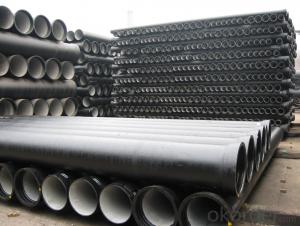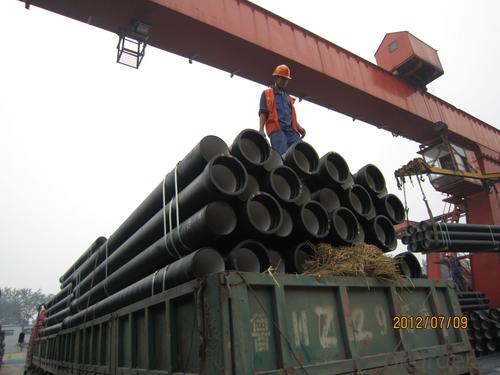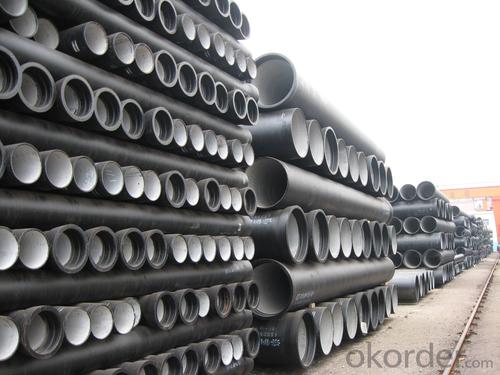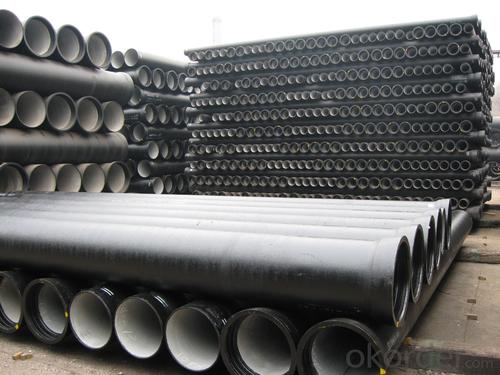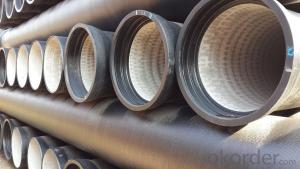Ductile Iron Pipe DN500
OKorder Service Pledge
Quality Product, Order Online Tracking, Timely Delivery
OKorder Financial Service
Credit Rating, Credit Services, Credit Purchasing
You Might Also Like
Specifications
Quick Details
| Place of Origin: | China (Mainland) | Brand Name: | CMAX | Model Number: | T type / K type / Flange type |
| Length: | 6m / 5.7m / Negotiable | Standard: | ISO2531 / EN545 / EN598 | Application: | Potable / Sewage water |
| Diameter: | DN80~DN2200 | Shape: | Round | Hardness: | 230 |
| Pipe Wall Thickness: | standard | Pull Strength: | 420 | Yield (≥ MPa): | 300 |
| Material: | Ductile Iron | Type: | Centrifugal ductile cast iron pipe | Certification: | ISO2531 / EN545 / EN598 |
| Outer Diameter: | 80-2200 | Thickness: | standard | Specification: | DN80~DN2200 |
| |
The advantages to the customer:
Trustworthy financial strength.
One-stop shopping.
Fast and efficient service.
Coordination of shipments from multiple plants.
Specialists of the overseas shipping process.
A more competitive price.
- Q: What are the typical applications for ductile iron pipes?
- Ductile iron pipes are commonly used for a variety of applications including water and sewage transportation, irrigation systems, fire protection systems, and industrial processes. They are also suitable for underground and aboveground installations due to their durability, corrosion resistance, and ability to handle high pressure and heavy loads.
- Q: Are ductile iron pipes suitable for use in paper mills?
- Yes, ductile iron pipes are suitable for use in paper mills. Ductile iron is known for its high strength and durability, making it an excellent choice for various industrial applications, including paper mills. These pipes can withstand high-pressure systems and are resistant to corrosion, making them suitable for transporting water, chemicals, and other fluids commonly used in paper mills. Additionally, ductile iron pipes have good impact resistance, which is beneficial in an environment where heavy machinery and equipment are often present. Overall, ductile iron pipes are a reliable and long-lasting option for paper mills due to their strength, durability, corrosion resistance, and ability to handle high-pressure systems.
- Q: What is the manufacturing process of ductile iron pipes? Thank you
- Ductile iron pipe is a pipe dream of urban water supply, gas pipelines, sets of high strength, good ductility and corrosion resistance strong strength, has the essence of iron, steel, cast iron pipe and steel pipe is a traditional popular replacement products, is a kind of widely used pressure water supply, gas and send pipes. Has the advantages of high strength, good toughness, corrosion resistance and easy device and other excellent characteristics, is the traditional grey iron and steel pipe replacement products popular, has become the preferred data of water supply, gas industry, set high strength, good ductility and corrosion resistance strong strength, has the essence of iron, steel, is the traditional cast iron pipe and steel pipe replacement products under the popular small as you introduce the ductile iron pipe is how to make the.
- Q: Are ductile iron pipes resistant to chemicals?
- Yes, ductile iron pipes are highly resistant to a wide range of chemicals, making them suitable for various applications involving corrosive substances.
- Q: What is the expected roughness coefficient of ductile iron pipes?
- The expected roughness coefficient of ductile iron pipes can vary depending on various factors such as pipe diameter, age, and condition. However, in general, the roughness coefficient for ductile iron pipes is typically around 0.01-0.015 mm. This value represents the average roughness of the internal surface of the pipe and is used in hydraulic calculations to determine the flow characteristics and pressure losses within the pipe network. It is important to note that these values are approximate and can vary based on specific pipe conditions and applications.
- Q: Are ductile iron pipes suitable for use in cooling water systems?
- Yes, ductile iron pipes are suitable for use in cooling water systems. Ductile iron pipes have excellent strength and durability, making them resistant to the high-pressure and corrosive nature of cooling water systems. They can withstand the extreme temperature variations and provide long-lasting performance. Additionally, ductile iron pipes have good resistance to the growth of microorganisms, which is important in maintaining the quality of the cooling water. Moreover, ductile iron pipes offer ease of installation and have a low maintenance requirement, making them a cost-effective choice for cooling water systems. Overall, ductile iron pipes are a reliable and suitable option for use in cooling water systems.
- Q: What is the expected joint deflection of ductile iron pipes?
- The expected joint deflection of ductile iron pipes depends on various factors such as the diameter of the pipe, the type of joint used, and the specific conditions of the installation. In general, ductile iron pipes are designed to accommodate some degree of deflection at the joints to allow for flexibility and movement. The American Water Works Association (AWWA) provides guidelines for the maximum allowable joint deflection for ductile iron pipes. According to AWWA C151/A21.51, the maximum deflection at the joint should typically not exceed 3 degrees or 1% of the nominal pipe diameter, whichever is greater. It is important to note that joint deflection should be within the specified limits to ensure the structural integrity and performance of the pipeline system. Excessive joint deflection can lead to leaks, failures, and reduced lifespan of the pipes. To determine the exact expected joint deflection for a specific installation, it is best to refer to the manufacturer's specifications and guidelines, as they may vary depending on the pipe size, joint type, and other factors. Consulting with a qualified engineer or contacting the manufacturer directly can provide more accurate information tailored to the specific project requirements.
- Q: What are the different accessories available for ductile iron pipe?
- There are several accessories available for ductile iron pipe, including but not limited to, flange adaptors, couplings, valves, fittings, joint restraints, gaskets, and tapping sleeves. These accessories help in connecting, repairing, and maintaining ductile iron pipe systems.
- Q: Can ductile iron pipes be used for fire protection systems?
- Yes, ductile iron pipes can be used for fire protection systems. Ductile iron is a type of cast iron that exhibits high strength and flexibility, making it suitable for a wide range of applications, including fire protection systems. It has excellent mechanical properties, including high tensile strength and impact resistance, which are important factors for withstanding the high pressures and stresses that can occur during fire suppression efforts. Ductile iron pipes are known for their durability and longevity, which is crucial for fire protection systems that need to be reliable and functional for extended periods of time. They have a longer lifespan compared to other materials, such as PVC or galvanized steel, and are less prone to corrosion, which is especially important for fire protection systems as they need to remain operational even after long periods of inactivity. Furthermore, ductile iron pipes have excellent fire resistance properties. They can withstand high temperatures without losing their structural integrity, ensuring that the fire protection system remains intact and functional during a fire emergency. This is crucial for ensuring the safety of occupants and minimizing property damage. In addition to their mechanical and fire-resistant properties, ductile iron pipes are also compatible with various types of fittings, valves, and accessories commonly used in fire protection systems. This allows for easy installation and integration into existing fire suppression networks. Overall, ductile iron pipes are a reliable and suitable choice for fire protection systems due to their high strength, durability, fire resistance, and compatibility with other system components.
- Q: How can the ductile iron pipe be welded?
- If the hole on the ductile iron pipe, you can use special hoop lined flexible rubber ring, rubber ring and pipe wall coating with rubber ring, glue to be fixed.
Send your message to us
Ductile Iron Pipe DN500
OKorder Service Pledge
Quality Product, Order Online Tracking, Timely Delivery
OKorder Financial Service
Credit Rating, Credit Services, Credit Purchasing
Similar products
Hot products
Hot Searches
Related keywords



